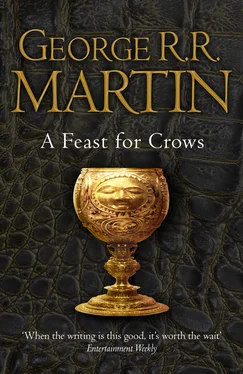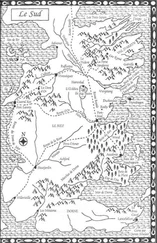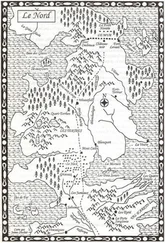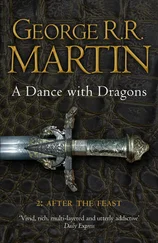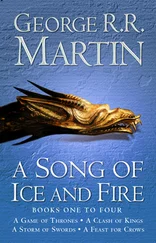The common room had begun to empty. Brienne tore a chunk of bread in half, listening to the talk at the other tables. Most of it concerned the death of Lord Tywin Lannister. “Murdered by his own son, they say,” a local man was saying, a cobbler by the look of him, “that vile little dwarf.”
“And the king is just a boy,” said the oldest of the four septas. “Who is to rule us till he comes of age?”
“Lord Tywin’s brother,” said a guardsman. “Or that Lord Tyrell, might be. Or the Kingslayer.”
“Not him,” declared the innkeep. “Not that oathbreaker.” He spat into the fire. Brienne let the bread fall from her hands and wiped the crumbs off on her breeches. She’d heard enough.
That night she dreamed herself in Renly’s tent again. All the candles were guttering out, and the cold was thick around her. Something was moving through green darkness, something foul and horrible was hurtling toward her king. She wanted to protect him, but her limbs felt stiff and frozen, and it took more strength than she had just to lift her hand. And when the shadow sword sliced through the green steel gorget and the blood began to flow, she saw that the dying king was not Renly after all but Jaime Lannister, and she had failed him.
The captain’s sister found her in the common room, drinking a cup of milk and honey with three raw eggs mixed in. “You did beautifully,” she said, when the woman showed her the freshly painted shield. It was more a picture than a proper coat of arms, and the sight of it took her back through the long years, to the cool dark of her father’s armory. She remembered how she’d run her fingertips across the cracked and fading paint, over the green leaves of the tree, and along the path of the falling star.
Brienne paid the captain’s sister half again the sum they had agreed, and slung the shield across one shoulder when she left the inn, after buying some hardbread, cheese, and flour from the cook. She left the town by the north gate, riding slowly through the fields and farms where the worst of the fighting had been, when the wolves came down on Duskendale.
Lord Randyll Tarly had commanded Joffrey’s army, made up of westermen and stormlanders and knights from the Reach. Those men of his who had died here had been carried back inside the walls, to rest in heroes’ tombs beneath the septs of Duskendale. The northern dead, far more numerous, were buried in a common grave beside the sea. Above the cairn that marked their resting place, the victors had raised a rough-hewn wooden marker. HERE LIE THE WOLVES was all it said. Brienne stopped beside it and said a silent prayer for them, and for Catelyn Stark and her son Robb and all the men who’d died with them as well.
She remembered the night that Lady Catelyn had learned her sons were dead, the two young boys she’d left at Winterfell to keep them safe. Brienne had known that something was terribly amiss. She had asked her if there had been news of her sons. “I have no sons but Robb,” Lady Catelyn had replied. She had sounded as if a knife were twisting her belly. Brienne had reached across the table to give her comfort, but she stopped before her fingers brushed the older woman’s, for fear that she would flinch away. Lady Catelyn had turned over her hands, to show Brienne the scars on her palms and fingers where a knife once bit deep into her flesh. Then she had begun to talk about her daughters. “Sansa was a little lady,” she had said, “always courteous and eager to please. She loved tales of knightly valor. She will grow into a woman far more beautiful than I, you can see that. I would often brush her hair myself. She had auburn hair, thick and soft … the red in it would shine like copper in the light of the torches.”
She had spoken of Arya too, her younger daughter, but Arya was lost, most likely dead by now. Sansa, though … I will find her, my lady, Brienne swore to Lady Catelyn’s restless shade. I will never stop looking. I will give up my life if need be, give up my honor, give up all my dreams, but I will find her.
Beyond the battleground the road ran beside the shore, between the surging grey-green sea and a line of low limestone hills. Brienne was not the only traveler on the road. There were fishing villages up along the coast for many leagues, and the fisherfolk used this road to take their fish to market. She rode past a fishwife and her daughters, walking home with empty baskets on their shoulders. In her armor, they took her for a knight until they saw her face. Then the girls whispered to one another and gave her looks. “Have you seen a maid of three-and-ten along the road?” she asked them. “A highborn maid with blue eyes and auburn hair?” Ser Shadrich had made her wary, but she had to keep on trying. “She may have been traveling with a fool.” But they only shook their heads and giggled at her behind their hands.
In the first village she came to, barefoot boys ran along beside her horse. She had donned her helm, stung by the giggles of the fisherfolk, so they took her for a man. One boy offered to sell her clams, one offered crabs, and one offered her his sister.
Brienne bought three crabs from the second boy. By the time she left the village it had begun to rain, and the wind was rising. Storm coming, she thought, glancing out to sea. The raindrops pinged against the steel of her helm, making her ears ring as she rode, but it was better than being out there in a boat.
An hour farther north, the road divided at a pile of tumbled stones that marked the ruins of a small castle. The right-hand fork followed the coast, meandering up along the shore toward Crackclaw Point, a dismal land of bogs and pine barrens; the left-hand ran through hills and fields and woods to Maidenpool. The rain was falling more heavily by then. Brienne dismounted and led her mare off the road to take shelter amongst the ruins. The course of the castle walls could still be discerned amongst the brambles, weeds, and wild elms, but the stones that had made them up were strewn like a child’s blocks between the roads. Part of the main keep still stood, however. Its triple towers were grey granite, like the broken walls, but their merlons were yellow sandstone. Three crowns, she realized, as she gazed at them through the rain. Three golden crowns. This had been a Hollard castle. Ser Dontos had been born here, like as not.
She led her mare through the rubble to the keep’s main entrance. Of the door only rusted iron hinges remained, but the roof was still sound, and it was dry within. Brienne tied her mare to a wall sconce, took off her helm, and shook out her hair. She was searching for some dry wood to light a fire when she heard the sound of another horse, coming closer. Some instinct made her step back into the shadows, where she could not be seen from the road. This was the very road where she and Ser Jaime had been captured. She did not intend to suffer that again.
The rider was a small man. The Mad Mouse, she thought, at her first sight of him. Somehow he’s followed me. Her hand went to her sword hilt, and she found herself wondering if Ser Shadrich would think her easy prey just because she was a woman. Lord Grandison’s castellan had once made that error. Humfrey Wagstaff was his name; a proud old man of five-and-sixty, with a nose like a hawk and a spotted head. The day they were betrothed, he warned Brienne that he would expect her to be a proper woman once they’d wed. “I will not have my lady wife cavorting about in man’s mail. On this you shall obey me, lest I be forced to chastise you.”
She was sixteen and no stranger to a sword, but still shy despite her prowess in the yard. Yet somehow she had found the courage to tell Ser Humfrey that she would accept chastisement only from a man who could outfight her. The old knight purpled, but agreed to don his own armor to teach her a woman’s proper place. They fought with blunted tourney weapons, so Brienne’s mace had no spikes. She broke Ser Humfrey’s collarbone, two ribs, and their betrothal. He was her third prospective husband, and her last. Her father did not insist again.
Читать дальше
